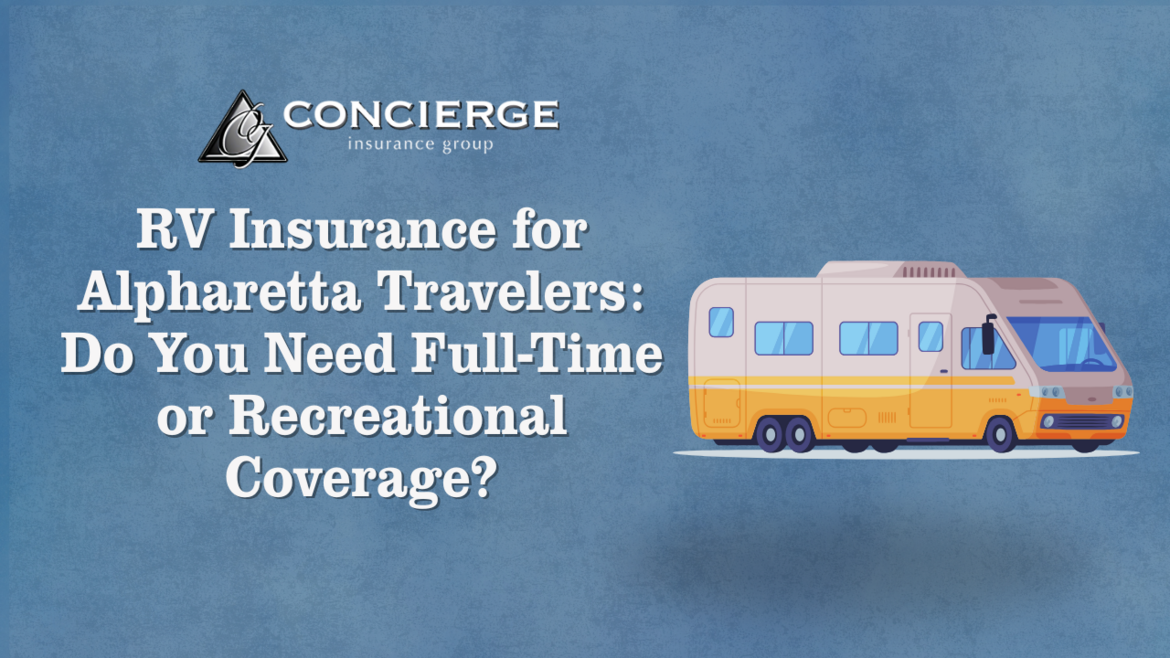
Are you unsure whether your RV lifestyle in Georgia calls for full-time insurance or recreational coverage?
Have you wondered if you're overpaying—or underprotected—when your motorhome doubles as your home or weekend escape?
You're not alone. Choosing the right RV insurance policy in Alpharetta, Georgia, hinges on understanding how coverage changes depending on how you use your rig.
In this article, you’ll learn exactly what sets full-time RV insurance apart from recreational coverage, how Georgia’s state laws apply, and how to make the right choice for your travel lifestyle.
Here’s what we’ll cover:
-
Georgia’s legal requirements for RV insurance
-
What full-time RV coverage includes—and why it costs more
-
How recreational policies are structured for seasonal and weekend use
-
Personal property protection, emergency services, and premium differences
-
Tips for Alpharetta residents working with local agents
Georgia’s RV Insurance Requirements
Georgia law requires minimum liability coverage for all motorhomes:
-
$25,000 per person / $50,000 per accident for bodily injury
-
$25,000 for property damage liability
Uninsured motorist coverage is also required—though you can opt out in writing. Travel trailers don’t need their own policy; the towing vehicle’s insurance applies.
If you're RVing from Alpharetta, you’ll find coverage from both national names like State Farm and local experts who understand North Georgia’s unique travel habits—from Stone Mountain Park to Vogel State Park.
What Is Full-Time RV Insurance?
Full-time RV insurance is designed for those living in their RV for six months or more each year. Think of it as homeowners insurance on wheels—far more comprehensive than a basic auto policy.
Key Benefits of Full-Time RV Coverage:
-
Personal liability protection while parked, like if a guest is injured at your campsite
-
Higher personal property limits for everything you own inside your RV
-
Medical payments coverage for visitor injuries in or around your parked RV
-
Loss assessment coverage for fees from RV parks or associations
-
Emergency expense reimbursement, often up to $5,000 if your RV is uninhabitable
Why it matters: If your RV is your home, this kind of policy covers the broader risks—from lawsuits to lodging—that come with full-time living.
Unique Risks for Full-Time RVers
When your RV holds everything you own, personal property coverage becomes critical. Full-timers are also exposed to:
-
Greater risk of liability with frequent guests
-
Displacement due to breakdowns or natural disasters
-
The need for temporary housing if the RV becomes uninhabitable
Auto insurance alone won’t cut it. Full-time RV insurance bridges the gap with residential-level protection.
Recreational RV Coverage: Ideal for Part-Time Travelers
If your RV is a vacation tool—not your primary residence—then recreational coverage is likely the better fit.
What’s Typically Included:
-
Basic liability coverage to meet Georgia’s requirements
-
Collision and comprehensive protection for theft, accidents, and severe weather
-
Limited personal property coverage for camping gear and electronics
-
Emergency expense coverage, usually up to $1,000 when you're 50+ miles from home
Seasonal and Storage Options
Recreational users can save with storage-only insurance during off-seasons. This protects your RV from theft and weather damage but excludes driving-related incidents.
Personal Property Coverage: What’s Actually Protected?
This is where the difference between full-time and recreational coverage is most stark.
| Feature | Full-Time Coverage | Recreational Coverage |
|---|---|---|
| Coverage Limit | Higher (replacement cost) | Lower (actual cash value) |
| Included Items | Appliances, clothing, valuables | Basic travel items |
| Add-Ons | Riders for jewelry, tech, etc. | Often limited or optional |
If you carry valuable items or rely on your RV full-time, full-time coverage is essential for protecting what matters most.
Comparing Premiums and Coverage Costs
Unsurprisingly, full-time coverage costs more. But you get more, too:
-
Expanded liability
-
Higher personal property limits
-
Specialized benefits for daily living
Recreational coverage costs vary based on:
-
RV value
-
Frequency of use
-
Where it’s stored
Georgia’s weather—think thunderstorms, hail, and flooding—also plays a role. Comprehensive coverage is worth serious consideration, no matter your usage.
Emergency Services and Roadside Help
Both policy types can include roadside assistance, especially valuable in Georgia’s rural and mountainous areas.
Coverage may include:
-
Towing and lockout services
-
Battery jumpstarts and flat tire help
-
Generator and slide-out repair (for full-timers)
Pro tip: Full-time plans often include higher limits and more specialized support—ideal for long-distance and year-round travelers.
How to Choose the Right RV Insurance for Your Needs
Ask yourself:
-
Do I use my RV as a residence for 6+ months a year?
-
How much personal property do I carry?
-
How often am I on the road or parked in new locations?
If you're living in your RV full-time, get full-time insurance.
If you're traveling seasonally or on weekends, recreational coverage may be enough.
Working with a local Alpharetta agent ensures your policy aligns with Georgia laws, regional risks, and your unique usage patterns.
Local Resources for Alpharetta RVers
You’re in a great spot to find expert help. Alpharetta is close to:
-
Blue Compass RV in Buford
-
Southern RV in McDonough and Cumming
Local insurance agents from State Farm, Brightway, and others can help you compare carriers, understand endorsements, and customize protection.
Conclusion: Which Coverage Fits Your RV Lifestyle?
At the end of the day, full-time RV coverage is for homeowners-on-wheels, while recreational coverage suits weekend warriors and part-time travelers.
Now that you understand the core differences, you’re equipped to:
-
Choose a policy that fits how you use your RV
-
Ensure compliance with Georgia law
-
Get proper protection for your rig and belongings
If you’re not sure which policy type best suits your needs, a local Alpharetta agent can guide you through the options—and help you get a quote that matches your lifestyle and budget.

